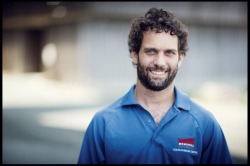Ocean Ambassadors: David Belanger

Ocean Ambassadors: David Belanger
David Belanger has seen the wonder and amazement on people’s faces when they get their first up-close look at the North Atlantic marine environment.
“You see them hold something like a sea star, which is a very common organism. They say, ‘Wow! We have these here?’ Then they’re full of questions. In fifteen minutes you can change their entire perspective on the ocean.”
He understands the astonishment. Growing up in Sherbrooke, Quebec, David was fascinated by the sea.
“Always watching Cousteau episodes,” he says with a grin. “Always interested in marine life.”
Today David is a doctoral candidate in marine biology at Memorial, studying rhodolith beds off the coast of Newfoundland and Labrador.
When he’s not diving for rhodolith samples or immersed in lab work at the Ocean Sciences Centre, he’s busy introducing the public to the beauty and diversity of the undersea world. The summer of 2014 was especially hectic.
On World Oceans Day he was at Middle Cove Beach, diving for fish and other sea creatures to show visitors. A few weeks later he volunteered at the Whale Festival at Cape Spear and Petty Harbour. He greeted tourists and locals at the OSC’s marine touch tanks and harp seal facility. He also made trips with the travelling touch tank, calling at locations across St. John’s and beyond.
“The most interesting thing is to see how many people are not very aware of what’s in the ocean,” he says. “I spend half of my time underwater, so for me it’s obvious. But it’s hard to see what’s going on underwater if you don’t have access to it. That’s where we help.”
David is also a teaching assistant with the Oceans Learning Partnership, which introduces high school students to ocean science and technology. The OLP brings together scientists and researchers from Memorial University, the Marine Institute, and Parks Canada, with funding by the Hebron Project.
“We get the students doing real science,” says David. “We have them identify different species. We do a fish dissection with them, and show them all the parts and the function of the organs. They leave with a real idea of how the work is done.”
“One day we had primary school kids, five and six years old. We played games with them, like counting sea stars. But we were still using real scientific techniques adapted for the games.”
The OLP program has expanded for the 2014-15 school year. High school students are working on real-world research projects, both in the field and at the OSC laboratory, with mentoring by scientists and graduate students.
“We’re getting more interactive with them, and more technical,” says David, who helped design the expanded program. “We have them working with GoPros and using Smart Boards. It’s hands-on activity, and it’s all based on studying the ecosystem here.”
David expects to complete his doctorate in two years. Wherever his career leads, he says, nurturing and inspiring the next generation of ocean professionals will be a part of it.
“You can tell that some of them have a passion for the ocean,” he says of the students he meets. “It’s exciting to show them what marine biology is all about. It gets them excited too, and it helps them make better choices about what they want to do.”
Photo: Dave Howells